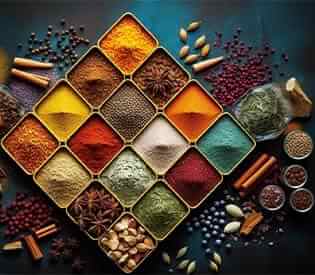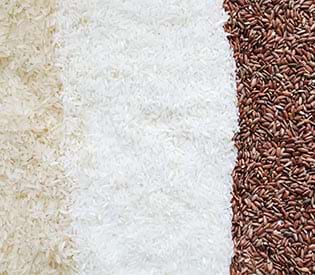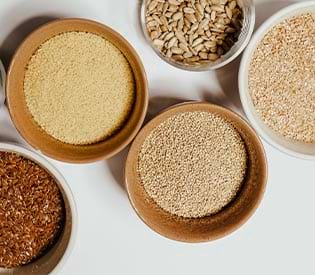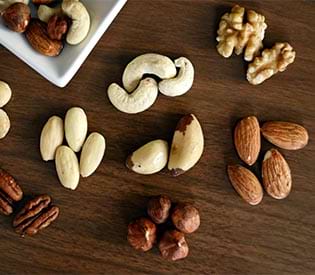Tomato Powder
📦🚚 Fast & Free shipping on all orders
What is tomato powder?
Originally intended as a convenience food, tomato powder was basically an instant tomato paste or sauce. Simply add water to complete the recipe! However, it's becoming more and more well-liked as a spice or condiment that goes well with rice, vegetables, meats, and fish. If you use tomato powder in its powdered form without rehydrating it, it qualifies as a spice. Any dried plant material used for flavoring apart from leaves, such as seeds, stems, bark, roots, and fruits, is referred to as a spice. Furthermore, as tomatoes are fruits, their dried fruits are unquestionably considered spices. To make tomato powder, one grinds dried tomatoes into a fine powder. Usually, we make tomato powder from the tomato skins, excluding the pulpy inner parts that contain the seeds. Think sun-dried tomatoes, except drier and coarsely crushed.
How do I use tomato powder?
The most common usage for tomato powder is to replace tomato paste, which saves you from opening an entire can only to use a spoonful or two. Mix equal quantities of tomato powder and warm water to form a paste. You can create a basic tomato sauce by incorporating additional water. But don't stop there. Try making your own tomato paste.
Tomato powder benefits:
Additionally, tomato powder is high in dietary fiber, which supports a sensation of fullness and helps the digestive system. Tomatoes include protective antioxidants like lycopene, which shield cells from harm by free radicals and may lower the chance of developing chronic illnesses including cancer, heart disease, and stroke.
◉ May help protect against skin cancer: Basal cell carcinoma and squamous cell carcinoma are two nonmelanoma skin malignancies for which sun exposure is a risk factor. Lycopene is a carotenoid that may be found in various foods, including tomatoes. This substance is found naturally and gives tomatoes their red hue. Though most studies have focused on dietary lycopene, scientists claim that lycopene also has a potent antitumor impact. The evidence for topical application's anticancer effects is weak to nonexistent.
In one experiment, researchers fed either red tomato powder or tangerine powder to hairless, healthy mice for 35 weeks. After that, they were subjected to UVB light three times per week. The control group did not get any light exposure, yet they consumed the same food. Researchers discovered that there were fewer tumor occurrences in the mice given the tomato diet. This implies that tomatoes may also save people from developing skin cancer. However, additional investigation is required to determine if topical lycopene use in people has any anticancer benefits.
◉ May reduce the risk of sunburns: Although they shouldn't be used in place of sunscreen, tomatoes' lycopene may provide some photoprotective benefits. Eating tomatoes may provide some protection against sunburn or erythema caused by UV radiation. According to 2006 research, participants showed less susceptibility to UV light after consuming lycopene or tomato products high in lycopene for 10–12 weeks. However, it's not certain whether putting tomatoes directly on your skin would have the same advantages. Even though tomatoes may lessen your chance of UV damage, you should always use sunscreen with an SPF of 30 or higher to prevent skin cancer and sunburns. "Natural" sunscreens don't always work as well as they should.
◉ May promote wound healing: A cup of tomatoes has around 30 grams of vitamin C, according to the U.S. Department of Agriculture's food database. Products for skin care often include vitamin C. It could encourage the formation of new connective tissues, which might hasten and aid in wound healing. Will you get the same advantages by adding tomato juice to your skin? That is not obvious. If applying the juice from foods high in vitamin C straight to your skin has any benefit, further study is required to determine this.
◉ May stimulate collagen production: Tomatoes are a wonderful source of vitamin C, as was previously established. In addition to strengthening your immune system, vitamin C may aid in collagen synthesis stimulation. Vitamin C used topically may help increase skin suppleness. Your skin may become firmer as a result. However, there is no proof from science that putting tomatoes on your skin would have these advantages.
Where can I buy tomato powder?
Buy tomato powder from the health food store in the USA, Alive Herbals.
Tomato powder information (at a glance):
| Product Name | Tomato Powder. |
| Scientific Name | Solanum lycopersicum |
| Country of Origin | It is native to USA |
| Ingredient | Tomato Powder. |
| Taste & Aroma | Aroma: tomatoey, rich, sweet, and umami-flavored. Taste: delicious taste. |
| Shelf Life & Storage | Shelf life is about 1–20 years. Store it in an airtight container in a cool, dry place and prevent sunlight exposure. |
| Precautions | We requested that, Before consuming spices, herbs, teas or any kind of natural products, you consult an expert qualified healthcare practitioner or herbalist. |
| Note | This product information has not been appraised by the Food and Drug Administration (FDA). This information is solely intended for educational purposes. |







